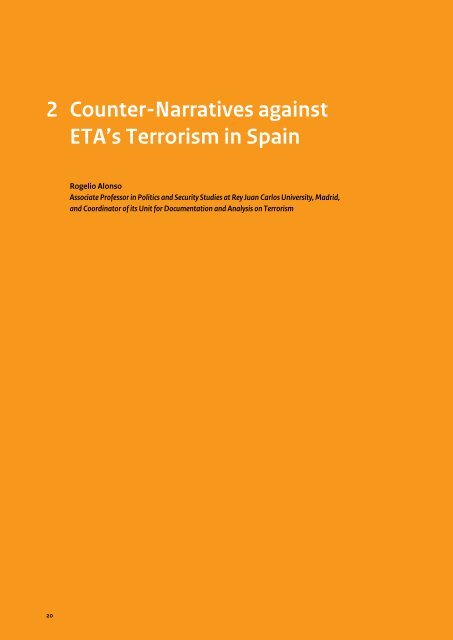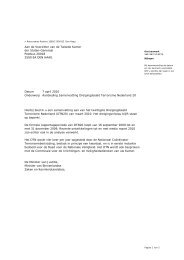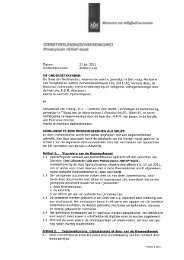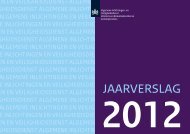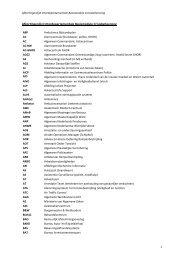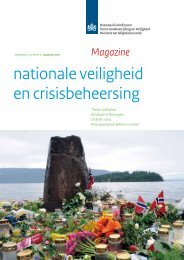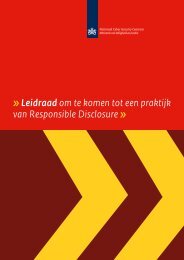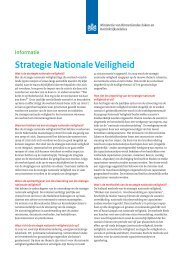Countering Violent Extremist Narratives
Countering Violent Extremist Narratives
Countering Violent Extremist Narratives
- No tags were found...
Create successful ePaper yourself
Turn your PDF publications into a flip-book with our unique Google optimized e-Paper software.
2 Counter-<strong>Narratives</strong> againstETA’s Terrorism in SpainRogelio AlonsoAssociate Professor in Politics and Security Studies at Rey Juan Carlos University, Madrid,and Coordinator of its Unit for Documentation and Analysis on TerrorismIntroductionThe Basque terrorist group Euskadi ta Askatasuna (ETA), meaning ‘Basque Homeland and Freedom’, has beenone of the most enduring terrorist organisations in Europe. Formed in 1959, ETA claimed its first killingin 1968. From then onwards the Spanish state faced an intense terrorist campaign that today still persists,albeit with a diminishing intensity. ETA’s protracted campaign of violence has, by August 2009, beenresponsible for 858 deaths and thousands of injuries, 1 making it the second most lethal terroristorganisation in Europe after the IRA.Starting in the late 1960s, Spain has faced a terrorist campaign by ETA, an organisation which is part ofwhat has been referred to as the third wave of modern terrorism. 2 ETA has espoused an ethno-nationalistideology on the basis of which it has legitimised its campaign for over thirty years. The political, social andcultural context in which this terrorist group emerged provides some explanation as to the origins of itsviolent campaign. Despite significant changes that have occurred in these contexts during the last threedecades, the threat of terrorism still continues in Spain.Throughout its protracted campaign, ETA has put forward several narratives and interpretations of theconflict in order to justify terrorism against a democratic society. This chapter will examine some of thenarratives expressed by the terrorist group and endorsed by its sympathisers. Furthermore, the chapter willlook at the counter-narratives put forward by different actors, both consciously and subconsciously, andboth directly via strategic messaging and indirectly as part of more ‘hard power’ counterterrorism policiesand actions, in their attempt to confront and neutralise ETA’s interpretation of events. As such, the chapterwill analyse the counter-narratives put forward by the following actors: successive Spanish administrationsand Basque governments, Spanish and Basque political parties, and civil society both in the BasqueCountry and the rest of Spain. Assessing the role played by these actors enables the establishment of thefailures and successes of the counter-narratives put in place in the battle for legitimacy against ETA.From dictatorship to democracy: countering the roots of the terrorist narrativeETA’s violence emerged in the context of the Franco dictatorship in Spain (1939-1975). The democratic deficitduring the regime led some Basque nationalists to demand a violent response that led to the formationof ETA. The group constituted a radicalised expression of Basque ethnic nationalism, a doctrine elaboratedin very traditionally religious and racist terms at the end of the nineteenth century. The ultimate goalwithin this ideology is the creation of a new state referred to as Euskal Herria, the ethno-linguistic areaclaimed by Basque separatists as their homeland. This entity would be made up of the three Spanishprovinces that make up the Basque Country (Guipuzkoa, Alava and Vizcaya), as well as another Spanishprovince outside the Basque Autonomous Community (Navarre), and the French parts of Labourd, Souland the Lower Navarre portions of Pyrénées Atlantiques.New left ideas exerted some influence over the ideology of ETA, particularly in the early days of theterrorist group, when separatist and irredentist aims were often mixed with socialism. Nonetheless, ETA’snationalist aspirations prevailed inside the group, with the ultimate goal of turning the Basque Countryinto the unified and monolingual state Euskal Herria. ETA’s main objective has not changed throughoutthe years, in spite of the important changes that Spanish society has undergone since the demise of theFranco dictatorship.2021


